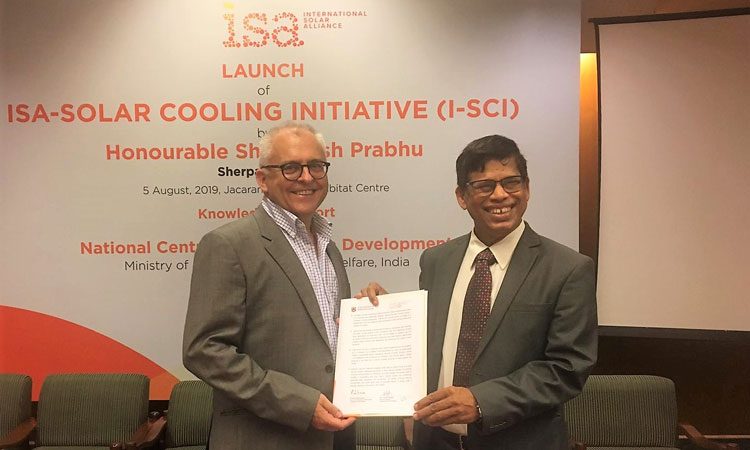Joint solar initiative launched to help farmers
- Like
- Digg
- Del
- Tumblr
- VKontakte
- Buffer
- Love This
- Odnoklassniki
- Meneame
- Blogger
- Amazon
- Yahoo Mail
- Gmail
- AOL
- Newsvine
- HackerNews
- Evernote
- MySpace
- Mail.ru
- Viadeo
- Line
- Comments
- Yummly
- SMS
- Viber
- Telegram
- Subscribe
- Skype
- Facebook Messenger
- Kakao
- LiveJournal
- Yammer
- Edgar
- Fintel
- Mix
- Instapaper
- Copy Link
Posted: 19 August 2019 | Rachael Harper (New Food Magazine) | No comments yet
A project has been launched to help farmers in ‘sun-rich’ countries make the most of chilled food distribution systems powered by solar solutions.


Director General ISA, H.E Mr Upendra Tripathy with Toby Peters, Professor in Cold Economy, University of Birmingham.
The International Solar Alliance (ISA) and the University of Birmingham are working together to help farmers in ‘sun-rich’ countries make the most of chilled food distribution systems powered by solar and solar-hybrid solutions.
This partnership is part of the Solar Cooling Initiative (I-SCI) which aims to spread the use of solar and solar-hybrid energy linked cold-chains and cooling systems for agricultural use in countries in the Tropics.
The two organisations will explore opportunities to research, plan and deliver such technologies in ISA member countries located between the Tropics of Cancer and Capricorn.
Agricultural economic growth in such countries depends upon connecting farmers with markets, the organisations say – cold chains are vital to transport perishable produce which can otherwise suffer up to 40 percent loss in the journey from farm to market. Cold-chain connectivity and reduction in food loss would ensure that the given volume of production generates more revenue and increases farmers’ economic wellbeing. However, cooling systems must be driven by sustainable technology if they are not increase the risk of climate change, they continue.


The aim of the initiative is to reduce waste and increase farmers’ income by integrating solar-powered cold chain systems.
“This initiative aims to enable millions of farmers by way of integrating cold-chains that work on solar fully or partially. The focus would be on farm-to-fork supply chains – reducing wastage and increasing farmers’ income, leading to economic wellbeing,” said HE Mr Upendra Tripathy, Director General, ISA. “This project will align with the ISA’s first programme ‘Scaling Solar for Applications in the Agricultural Use’. It is noteworthy that 28 countries have joined this programme to install 270,000 solar water pumps for which ISA has launched a global aggregation and price discovery tender.”
Cooling systems are typically energy-intensive and the use of solar-powered technologies can add to energy efficiency and reduce environmental impacts. Introducing solar-derived energy hybrids would contribute to reducing global greenhouse gas emissions from food loss and waste – currently estimated at 4.4 gigatons of eCO2 each year, the organisations say.
The I-SCI project aims to simultaneously address three internationally agreed goals: the Paris Climate Agreement; the Kigali Amendment to the Montreal Protocol; and the UN’s Sustainable Development Goals (SDGs).
Related topics
Environment, Equipment, New product development (NPD), Product Development, Refrigeration and freezing, Research & development, Technology & Innovation, Temperature control
Related organisations
International Solar Alliance (ISA), University of Birmingham









